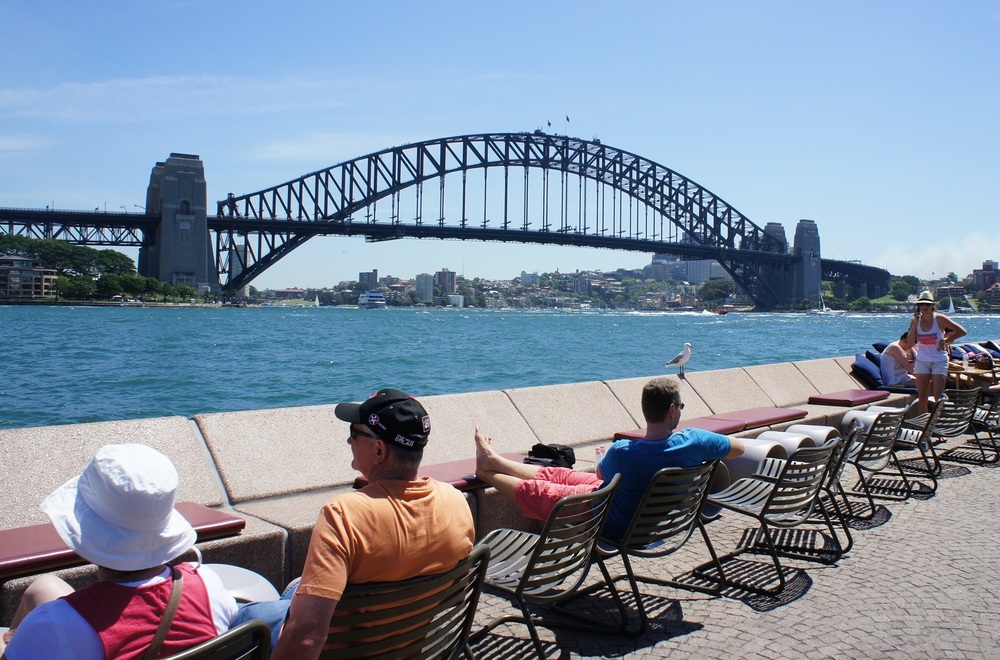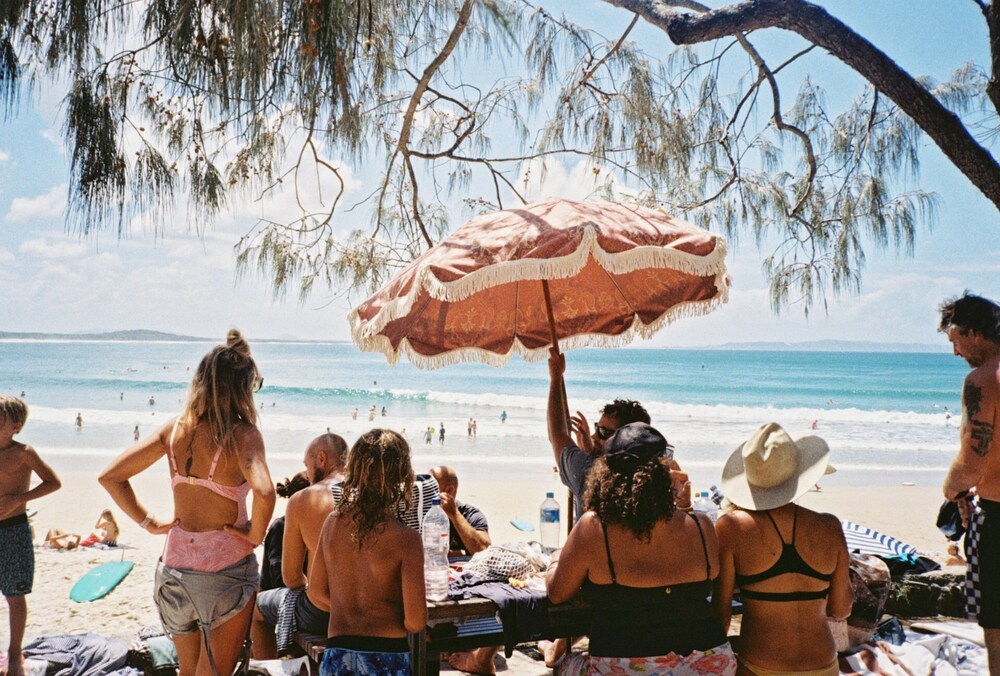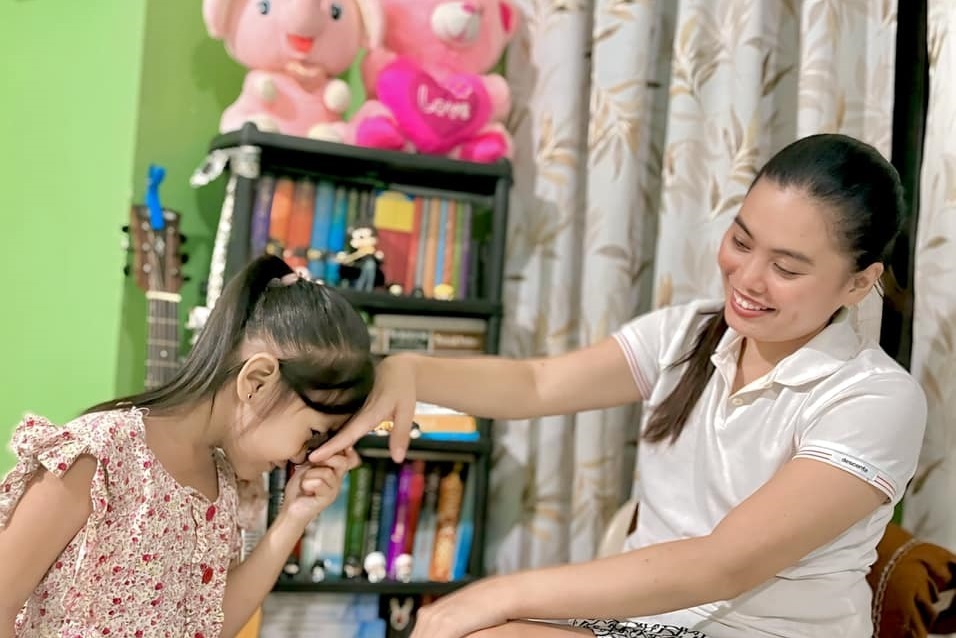
- Writer / 記事を書いた人
-

- Mark Kelly
-
 Australia(オーストラリア)
Australia(オーストラリア)
Article
記事
How to Speak Like a True Blue Aussie
本物のオージーのように話す方法
▼ 記事の音声を再生
<Let's learn!>
・Have you ever …?
・… is used
・There is nothing to …
=====================================
In Australia, you can hear many slang terms when you’re speaking with “Aussie” people. Let’s take a look at some common expressions.
1. Have you ever heard the expression “G’day”? “G’day” is a friendly way to say hello. It is short for “good day.” For example, you can greet a friend with, “G’day, mate!”
2. In “Oz” – an informal name for Australia - “cheers” or “ta” is commonly used to say thank you. You can reply with “no worries”, which means no problem, or you’re welcome.
3. To let people know that everything will be OK or there is nothing to worry about, you can say, “she’ll be right.” The word “she” is usually used to refer to a woman, right? In this case, it doesn't mean a woman, but we can use it anyway.
For example:
Person A: “I think we are lost.”
Person B: “She’ll be right, mate. We can ask the next person we meet for directions.”
Common Australian Slang:
- brekky = breakfast
“What did you have for brekky?”
- barbie = barbeque (BBQ)
“Do you want to have a barbie at the beach this weekend?”
- sanga = sandwich
“Can I get a sausage sanga?”
*You can try it with BBQ or “barbie” sauce, which is popular in Australia.
- arvo = afternoon
“What will you do this arvo?”
Understanding some common Australian slang terms can make communication with Aussies a little easier. With a little practice, you'll be speaking like a true Aussie in no time! What slang terms do you have in your country that are interesting for foreigners?
- 日本語訳を見る
オーストラリアでは、「オージー」の人々と話すと、多くのスラング用語を聞くことができます。いくつかの一般的な表現を見てみましょう。
1「G’day」という表現を聞いたことがありますか?「G'day」は、親しみを込めて「こんにちは」と言う方法です。これは「good day」の短縮形です。例えば、友達に「G'day, mate!」と挨拶することができます。
2「Oz」(オーストラリアの非公式な呼び名)では、「cheers」や「ta」が「ありがとう」と言うのによく使われます。あなたは「no worries」と返事をすることができます。これは「問題ないよ」や「どういたしまして」という意味です。
3すべてが上手くいくことや何も心配することはないことを伝えるために、「she'll be right」と言うことができます。「she」という言葉は通常、女性を指すために使われますよね?この場合、「she」は女性を意味するわけではありませんが、それでも私達はこの表現を使います。
例えば:
Aさん:「僕たち道に迷ってしまったようだね。」
Bさん:「大丈夫だよ、君。次に会う人に道を聞けばいいさ。」
一般的なオーストラリアのスラング:
- brekky = breakfast(朝食)
「朝食に何を食べたの?」
- barbie = barbeque(バーベキュー)
「今週末、ビーチでバーベキューをしない?」
- sanga = sandwich(サンドウィッチ)
「ソーセージサンドイッチをもらえますか?」
*オーストラリアで人気のバーベキューソース、または「バービー」ソースと一緒に試してみてください。
- arvo = afternoon(午後)
「今日の午後は何をする予定?」
一般的ないくつかのオーストラリアのスラング表現を理解すると、オーストラリア人とのコミュニケーションが少し楽になります。少し練習すれば、すぐに本物のオージーのように話せるようになりますよ!あなたの国には、外国人にとって興味深いスラング表現はどんなものがありますか?

Key Points
キーポイント
Repeat each word(s) and example sentence(s) after your teacher/tutor.
先生の後に続いて、各フレーズ、単語、例文を言ってみましょう。自習の場合はスピーカーボタンを押して聞いてみましょう。
Key Phrases 重要表現
- Have you ever …?
-
…したことはありますか?
-
Have you ever seen a koala in person?
実際にコアラを見たことがありますか?
- … is used
-
…は使われる
-
"Arigato" is used to say thank you in Japan.
「ありがとう」は日本でお礼を言うために使われます。
- There is nothing to …
-
…するものは何もない
-
The room is empty, there is nothing to show you.
部屋は空っぽで、見せるものは何もありません。
Key Vocabulary 重要単語・熟語
- slang
-
slæŋ
スラング, 俗語
名詞
- informal, spoken language, often used among a particular group
-
He uses a lot of slang when he talks to his friends.
彼は友達と話すときにたくさんのスラングを使います。
- Aussie
-
ˈɑː.zi
オーストラリア人、オーストラリアの
名詞
- Australian, or an Australian person
-
He's an Aussie who loves surfing.
彼はサーフィンが大好きなオーストラリア人です。
- expression
-
ɪkˈspreʃ·ən
表現
名詞
- a group of words that has a special meaning
-
The expression 'time flies' means that time passes quickly.
「time flies」という表現は時間が早く過ぎることを意味します。
Others その他
- terms
-
tɜːmz
言い方,表現.
名詞
- a word or phrase that is used to mean a particular thing
-
He explained the concept in simple terms.
彼はその概念を簡単な表現で説明しました。
- greet
-
gríːt
挨拶する
動詞
- to say hello to someone who has arrived in a place
-
The receptionist greets all visitors with a warm smile.
受付係はすべての訪問者に温かい笑顔で挨拶します。
- informal
-
ɪnˈfɔr·məl
非公式の、くだけた
形容詞
- not official
-
Australians often use 'mate' as an informal way of saying 'friend'.
オーストラリア人は「mate」を「friend(友達)」のくだけた言い方としてよく使います。
- commonly
-
ˈkɒmənli
一般的に、通常、よく
副詞
- usually or by most people
-
In Australia, kangaroos are commonly seen in the wild.
オーストラリアでは、カンガルーは野生でよく見られます。
- reply
-
rɪˈplɑɪ
返事をする、答える
動詞
- to answer
-
He didn't reply to my email.
彼は私のメールに返信しませんでした。
- let
-
let
~させる
動詞
- to allow someone to do something or have something
-
Let me ask you how you achieved such great results.
どうやってそんな素晴らしい結果を達成したのか質問させてください。
- be lost
-
道に迷う
- not knowing where you are
-
I'm lost. Could you help me find my way?
道に迷いました。道案内をお願いできますか?
- direction
-
dɑɪˈrek·ʃən
道、道順、方向
名詞
- instructions that tell you how to get to a place
-
She gave me directions to her house.
彼女は(彼女の)家への道順を教えてくれました。
- refer to…
-
rɪˈfɜr tʊ
…に言及する
動詞
- to mention or speak about someone or something
-
The report refers to several key findings from the study.
レポートは研究におけるいくつかの重要な発見に言及しています。
Practice
練習
Fill in the blanks to complete the sentence.
空欄を埋めて文章を完成させましょう。
(___)(___)(___) been to any foreign countries before?
今までにどこか外国に行ったことがありますか?
ヒント:Have you ever
- 回答を見る
(Have)(you)(ever) been to any foreign countries before?
The material (___)(___) for this eco-friendly building.
その素材はこの環境に優しい建物に使用されています。
ヒント:… is used
- 回答を見る
The material (is)(used) for this eco-friendly building.
(___)(___)(___)(___) do in this small town on a rainy day.
雨の日にはこの小さな町では何もすることがありません。
ヒント:There is nothing to …
- 回答を見る
(There)(is)(nothing)(to) do in this small town on a rainy day.
Article
記事(英文のみ)
Read the article aloud on your own or repeat each paragraph after your teacher/tutor.
記事を自分で読む、または先生に続いて段落毎に読んでみましょう。
How to Speak Like a True Blue Aussie
<Let's learn!>
・Have you ever …?
・… is used
・There is nothing to …
=====================================
In Australia, you can hear many slang terms when you’re speaking with “Aussie” people. Let’s take a look at some common expressions.
1. Have you ever heard the expression “G’day”? “G’day” is a friendly way to say hello. It is short for “good day.” For example, you can greet a friend with, “G’day, mate!”
2. In “Oz” – an informal name for Australia - “cheers” or “ta” is commonly used to say thank you. You can reply with “no worries”, which means no problem, or you’re welcome.
3. To let people know that everything will be OK or there is nothing to worry about, you can say, “she’ll be right.” The word “she” is usually used to refer to a woman, right? In this case, it doesn't mean a woman, but we can use it anyway.
For example:
Person A: “I think we are lost.”
Person B: “She’ll be right, mate. We can ask the next person we meet for directions.”
Common Australian Slang:
- brekky = breakfast
“What did you have for brekky?”
- barbie = barbeque (BBQ)
“Do you want to have a barbie at the beach this weekend?”
- sanga = sandwich
“Can I get a sausage sanga?”
*You can try it with BBQ or “barbie” sauce, which is popular in Australia.
- arvo = afternoon
“What will you do this arvo?”
Understanding some common Australian slang terms can make communication with Aussies a little easier. With a little practice, you'll be speaking like a true Aussie in no time! What slang terms do you have in your country that are interesting for foreigners?
Questions
質問
Answer the questions based on the article.
記事の内容から質問に回答しましょう。
How can you reply to “cheers” in Australia?
オーストラリアで“cheers”にどう返事をしますか?
ヒント:You can reply with ~
- 回答を見る
You can reply with “no worries” or “you’re welcome”.
What does “brekky” mean in Australia?
オーストラリアで 'brekky' はどんな意味ですか?
ヒント:"Brekky" means ~ in Australia.
- 回答を見る
"Brekky" means breakfast in Australia.
What sauce do Aussies like to eat with a sausage sanga?
オーストラリア人はソーセージサンガにどんなソースをかけるのが好きですか?
ヒント:They like ~.
- 回答を見る
They like BBQ or “barbie”sauce.
Discussion
ディスカッション
Let’s have a discussion about the theme with your teacher/tutor or classmates.
先生やクラスメートとテーマについて話し合いましょう。
With your teacher/tutor 先生とのディスカッション
Have you ever heard any Australian slang before?
今までにオーストラリアのスラングを聞いたことがありますか?
Yes, I have. I have heard ~ /
No, I haven't.
What do you think about the Australian slang?
オーストラリアのスラングについてどう思いますか?
I think Australian slang is ~.
What is the most common Japanese slang that you think foreigners should know?
外国人が知っておくべき最も一般的な日本語のスラングは何だと思いますか?
The most common Japanese slang that foreigners should know is ~.
With your classmates クラスメートとのディスカッション
What do you like to have for brekky?
朝ごはんに何を食べるのが好きですか?
I like to have ~ for brekky.
Which slang do you want to use in Australia?
オーストラリアで使ってみたいスラングはどれですか?
I want to use the slang ~ in Australia.
What is an informal Japanese slang that may be interesting for foreigners?
外国人にとって興味深いかもしれない日本語のくだけたスラングは何ですか?
It is ~.








